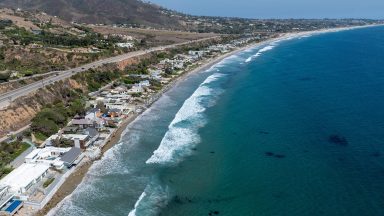ARTICLE AD

Another earthquake struck Southern California on Monday, Sept. 16—the second in less than five days.
On Thursday, Sept. 12, a quake centered in Malibu rattled most of Los Angeles County. Residents were jolted awake around 7:30 a.m. local time. Many immediately wondered about the magnitude of the shake. While earthquakes are not uncommon in L.A., recent tremors have increased local anxiety over the years.
Here’s everything to know about the earthquakes and the aftershocks.
What Were the Magnitudes of the L.A. Earthquakes?
Monday, Sept. 16 — A preliminary 3.6-magnitude earthquake struck the Malibu area around 4:22 a.m. Pacific Time at a depth of nearly seven miles, according to the U.S. Geological Survey. No injuries or damage were immediately reported.
A 3.6 magnitude earthquake occurred 4.35mi N of Malibu, CA. Details: https://t.co/FXAOXUsoTD Map: https://t.co/JTCrnl1ay6
— LA QuakeBot (@earthquakesLA) September 16, 2024
Thursday, September 12 — According to the U.S. Geological Survey, the earthquake on September 12 had a magnitude of 4.7. NBC Los Angeles reported that the initial magnitude was measured at 5.1 but was later downgraded to 4.7. No damage to infrastructure or major injuries has been reported at the time of publication.
The California Geological Survey’s X account confirmed the quake. The tweet read, “A M4.7 earthquake just occurred near the coast of Malibu [sic]. Moderate shaking was felt near the epicenter and the west Los Angeles area. Aftershocks can be expected.”
A M4.7 earthquake just occurred near the coast of Malibu. Moderate shaking was felt near the epicenter and the west Los Angeles area. Aftershocks can be expected. #Malibu #earthquake #Myshake @USGS @Cal_OES @CalConservation pic.twitter.com/7GENKnTvfl
— California Geological Survey (@CAGeoSurvey) September 12, 2024
Per KTLA, the California Highway Patrol (CHP) reported that some boulders and rocks rolled onto Malibu Canyon Road in a tunnel near Piuma Road. This was where the epicenter was located. Officials started removing rocks from the scene that morning.
Was There an Aftershock of the L.A. Earthquake?
Monday, Sept. 16 — KTLA’s Eric Spillman commented on Monday morning’s quake, saying, “It’s possibly an aftershock of the quake we had several days ago.” He noted that the network’s studio, located on Sunset Boulevard in Hollywood, did not feel the tremor. However, according to the USGS’s “Did You Feel It?” map, the quake was felt as far away as Long Beach to the southeast and Ventura to the northwest.
Thursday, September 12 —Following Thursday’s temblor, several small aftershocks were reported, including one with a magnitude of 2.8 that occurred in the epicenter of Malibu just two minutes after the initial earthquake. Officials warned residents in Malibu, Hermosa Beach, Anaheim, Santa Monica, and surrounding areas to expect more aftershocks in the days ahead.
getting shook awake by that LA earthquake #earthquake
pic.twitter.com/CfvtqO9fd3
— Xarlos (@JuanCafecito) September 12, 2024
What Should You Do in Case of an Earthquake?
During an earthquake, experts stress the importance of knowing the proper steps to protect yourself and minimize injury. The California Department of Public Health (CDPH) offers detailed guidelines on what to do during these events. Here are some key steps to take in case of an earthquake:
1. Drop, Cover, and Hold On: Drop to your hands and knees to prevent being knocked over. Cover your head and neck (or your whole body, if possible) to protect yourself from falling debris. If you’re indoors, take cover under a sturdy piece of furniture like a table or desk. Hold on until the shaking stops.
2. Stay Indoors: If you’re inside, stay there. Do not run outside during the shaking, as you risk injury from falling debris. Stay away from windows, glass, and other items that could shatter.
3. If You’re Outdoors: Move away from buildings, streetlights, and utility wires. Drop to the ground and cover your head and neck.
4. If You’re in a Vehicle: Pull over to a safe location, away from overpasses, bridges, and large trees. Remain in the vehicle with your seatbelt fastened until the shaking stops.
5. After the Shaking Stops: Be cautious of potential aftershocks, which can follow the main quake. Check yourself and others for injuries and provide first aid if necessary. Avoid using elevators and be careful of potential hazards like gas leaks or damaged electrical wires.
6. Follow Emergency Instructions: Listen to local news or emergency services for updates and instructions.

.png) 2 months ago
15
2 months ago
15 

